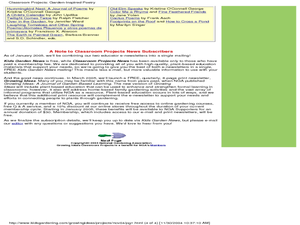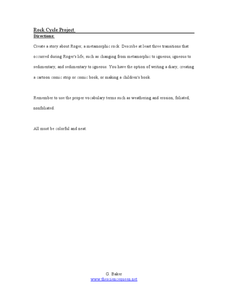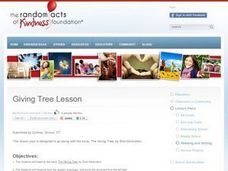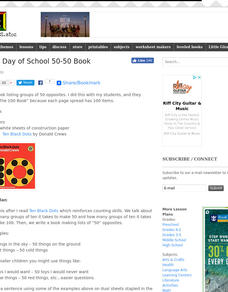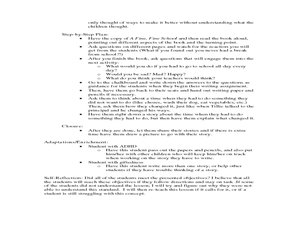Curated OER
Growing Poems
Students write garden inspired poetry. In this poetry lesson plan, students go out into the garden and write poems about how they feel, what they see, and what is going on in the garden.
Curated OER
Reading Pattern Books
Students investigate pattern books. In this literature lesson, students read the book Brown Bear, Brown Bear What Do You See? and use echo and choral reading strategies. Students identify the pattern in the text and write about the...
Curated OER
Making Mittens with The Mitten Book
Students read and discuss the different animals in The Mitten book and then try to make mittens that are alike.
Curated OER
Writing with Vivid Verbs
Students find vivid verbs in literature and use them in their own writing. In this vivid verbs lesson, students use a 'Thinking Thesaurus' of major verbs to study common verbs. Students then practice rewriting sentences using vivid...
Curated OER
Comma Splices
Ah, the comma splice; somehow it works its way into middle and high schoolers' writing quite often. To start, this learning exercise defines comma splice and focuses on the four ways to correct them. For practice, pupils correct the...
Roald Dahl
The Twits - The Monkeys Escape
Houses come in all shapes and sizes, but not all houses are safe from Mr. and Mrs. Twit. The 10th instructional activity in a unit designed to accompany The Twits by Roald Dahl turns learners into architects. While designing houses for...
Curated OER
Alexander and the Wind-Up Mouse
Students explore English by reading a children's book in class. In this story vocabulary instructional activity, students read the book Alexander and the Wind-Up Mouse and discuss the use of three vocabulary words. Students define the...
Curated OER
Introduce Vocabulary: Madeline’s Rescue
Students explore language arts by reading a children's book in class. In this story vocabulary lesson, students read the book Madeline's Rescue and identify the use of specific vocabulary words. Students define vocabulary terms and...
Curated OER
Introduce Vocabulary: The Biggest Pumpkin Ever
Learners explore vocabulary by reading a children's book in class. In this tier two words instructional activity, students read the book The Biggest Pumpkin Ever and identify the use of specific vocabulary words. Learners define the...
Curated OER
Introduce Vocabulary: The Story of Ruby Bridges
Students explore language arts by reading a children's book in class. In this story vocabulary instructional activity, students read the book The Story of Ruby Bridges and identify the use of specific vocabulary words. Students define...
Curated OER
Rock Cycle Project
In this rock cycle worksheet, students design a project to describe the life of a metamorphic rock. They can write the project as a diary, a comic strip, a comic book or a children's book.
Curated OER
Giving Tree Lesson
Students read and respond the book, The Giving Tree. In this literary unit, students listen to the story and discuss the story using Bloom's Taxonomy. Students write a letter of empathy to the tree and observe the changes the tree went...
Curated OER
Activity Plan 5-6: Let's Create Stories!
Students examine wordless books and other pictures in order to learn how the teacher "reads a picture" to tell a story about it. In this early writing lesson, students then create their own picture for story telling by painting....
Curated OER
Cause and Effect with "Cloudy With a Chance of Meatballs"
Fourth graders explore reasoning by reading a book with their classmates. In this cause and effect lesson, 4th graders read the children's story Cloudy with a Chance of Meatballs and discuss the story elements, characters and plot....
Curated OER
Who Moved My Cheese
Fifth graders write advice for people on how they can deal with change. In this dealing with change lesson plan, 5th graders read a book about change, discuss it, and come up with solutions for people who struggle.
Curated OER
Techno Book
First graders explore language arts by utilizing educational software. In this storytelling instructional activity, 1st graders utilize Microsoft Word to create their own children's story incorporating images as well. Students proofread...
Curated OER
Introduce Vocabulary: Into the A, B, Sea
Students explore language arts by reading a classic book in class. In this story vocabulary lesson, students read the book Into the A, B, Sea and identify the use of specific vocabulary words. Students define the story vocabulary words...
Curated OER
Experience This!
What would you do if you had to go to school all day every day? Tillie tackles this problem in Sharon Creech’s A Fine, Fine School. After a discussion of how Tillie got the principal to change his ways, brainstorm with your class...
Curated OER
Arthur and His Pals
Arthur, the main character in Marc Brown’s books, is the star of this lesson plan. Pairs of researchers select one character from the Arthur series and use the internet to access Brown’s web site and learn more about their chosen...
Curated OER
Drama from Animal Characters
Learn about animal habitats, characteristics, and writing in a different perspective. The class composes a narrative from the perspective of a fresh water animal, they include a problem and the animal's reaction to the problem. The...
Curated OER
Three-Meal Weather: Food inspired adjectives from "Cloudy with a Chance of Meatballs"
Students complete a list of food adjectives based on the book Cloudy With A Chance of Meatballs. In this adjectives lesson plan, students also compose a 3 part piece of writing based on an entire day of raining food.
Curated OER
Guided Reading: Three Little Pigs (Plus Wolf: Javalinas)
Guide your class through reading various versions of The Three Little Pigs. Talk about the traditional story line and then discuss a different point of view: Maybe the wolf was just an innocent bystander! This lesson plan, which has...
Curated OER
Magic Tree House #13: Reading Questions
Reading comprehension questions for the 13th Magic Tree House book, Vacation Under the Volcano, are divided by chapter. Each chapter warrants three to five questions. They cover basic comprehension, vocabulary, and some inference.


